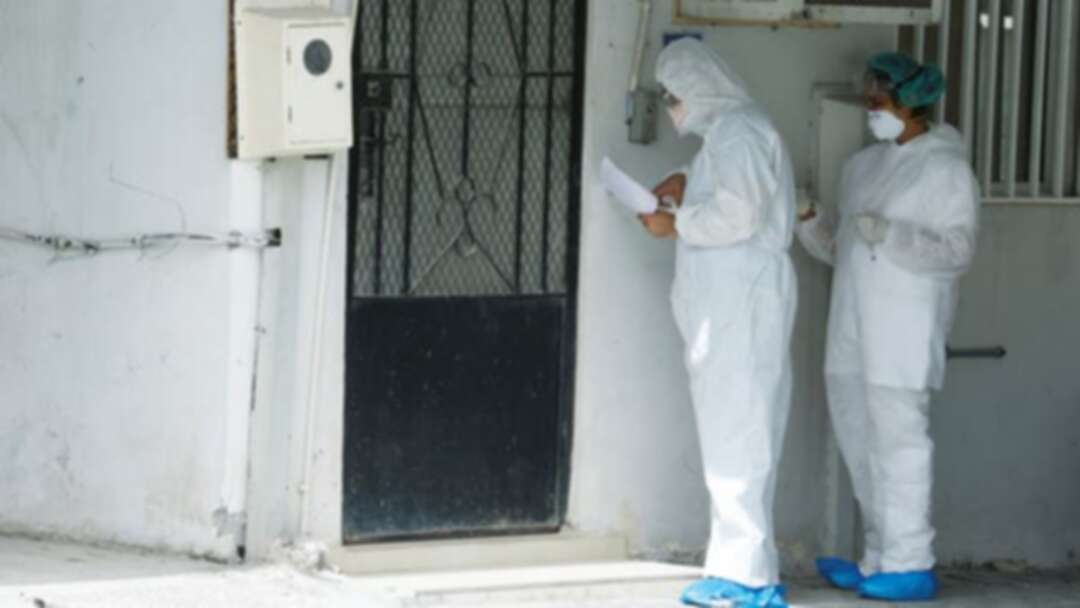-
Middle East still has chance to contain coronavirus spread: WHO

Most Middle Eastern countries are seeing worrying daily increases in cases of the new coronavirus but the region still has a chance to contain its spread, a senior World Health Organization (WHO) official said on Tuesday. Middle East
The WHO has confirmed more than 77,000 cases and nearly 4,000 deaths in its Eastern Mediterranean region, which includes Pakistan, Afghanistan, Somalia, and Djibouti, as well as Middle Eastern states, but does not include Turkey.
About 78 percent of those cases are in Iran, with all other countries having fewer than 4,000 cases, and most fewer than 1,000, said Richard Brennan, the WHO’s regional emergency director.
The death rate in the region was similar to that globally and there have been encouraging signs of new cases in Iran flattening off in recent days, though other states were still at risk of an escalation, Brennan told a media briefing in Cairo. Middle East
 A member of the medical team sprays disinfectant as a precautionary move amid concerns over the coronavirus disease (COVID-19) outbreak at the underground Al Shohadaa Martyrs metro station in Cairo, Egypt on March 22, 2020. (Reuters)
A member of the medical team sprays disinfectant as a precautionary move amid concerns over the coronavirus disease (COVID-19) outbreak at the underground Al Shohadaa Martyrs metro station in Cairo, Egypt on March 22, 2020. (Reuters)“Of all the other countries, in most instances, we are seeing still a concerning rise in the number of cases day after day,” he said.
“We do need a comprehensive approach to the way we scale up the proven public health measures such as the early detection, such as the early testing, the isolation of patients who have the disease.”
Many countries in the region are suffering from the effects of conflict and political crises, raising concerns about their ability to cope with the new coronavirus.
 A Syrian refugee woman puts a face mask on a boy as a precaution against the spread of coronavirus, in the al-Wazzani area, in southern Lebanon, March 14, 2020. (Reuters) Middle East
A Syrian refugee woman puts a face mask on a boy as a precaution against the spread of coronavirus, in the al-Wazzani area, in southern Lebanon, March 14, 2020. (Reuters) Middle East International agencies have raised particular concern over millions of refugees and internally displaced people, and have cautioned that the closure of borders can make the delivery of assistance harder. levant
source: Reuters levant
You May Also Like
Popular Posts
Caricature
BENEFIT Sponsors BuildHer...
- April 23, 2025
BENEFIT, the Kingdom’s innovator and leading company in Fintech and electronic financial transactions service, has sponsored the BuildHer CityHack 2025 Hackathon, a two-day event spearheaded by the College of Engineering and Technology at the Royal University for Women (RUW).
Aimed at secondary school students, the event brought together a distinguished group of academic professionals and technology experts to mentor and inspire young participants.
More than 100 high school students from across the Kingdom of Bahrain took part in the hackathon, which featured an intensive programme of training workshops and hands-on sessions. These activities were tailored to enhance participants’ critical thinking, collaborative problem-solving, and team-building capabilities, while also encouraging the development of practical and sustainable solutions to contemporary challenges using modern technological tools.
BENEFIT’s Chief Executive Mr. Abdulwahed AlJanahi, commented: “Our support for this educational hackathon reflects our long-term strategic vision to nurture the talents of emerging national youth and empower the next generation of accomplished female leaders in technology. By fostering creativity and innovation, we aim to contribute meaningfully to Bahrain’s comprehensive development goals and align with the aspirations outlined in the Kingdom’s Vision 2030—an ambition in which BENEFIT plays a central role.”
Professor Riyadh Yousif Hamzah, President of the Royal University for Women, commented: “This initiative reflects our commitment to advancing women in STEM fields. We're cultivating a generation of creative, solution-driven female leaders who will drive national development. Our partnership with BENEFIT exemplifies the powerful synergy between academia and private sector in supporting educational innovation.”
Hanan Abdulla Hasan, Senior Manager, PR & Communication at BENEFIT, said: “We are honoured to collaborate with RUW in supporting this remarkable technology-focused event. It highlights our commitment to social responsibility, and our ongoing efforts to enhance the digital and innovation capabilities of young Bahraini women and foster their ability to harness technological tools in the service of a smarter, more sustainable future.”
For his part, Dr. Humam ElAgha, Acting Dean of the College of Engineering and Technology at the University, said: “BuildHer CityHack 2025 embodies our hands-on approach to education. By tackling real-world problems through creative thinking and sustainable solutions, we're preparing women to thrive in the knowledge economy – a cornerstone of the University's vision.”
opinion
Report
ads
Newsletter
Subscribe to our mailing list to get the new updates!






















